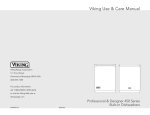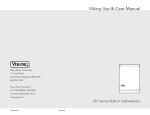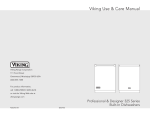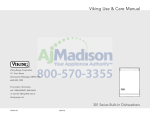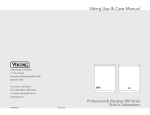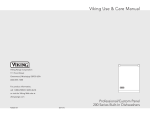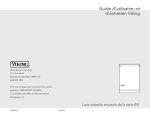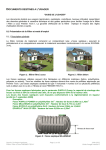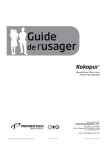Download Viking 450E Use & care guide
Transcript
Viking Use & Care Manual ® Viking Range Corporation 111 Front Street Greenwood, Mississippi 38930 USA (662) 455-1200 For product information, call 1-888-VIKING1 (845-4641) or visit the Viking Web site at vikingrange.com Professional & Designer 325E & 450E Series Built-In Dishwashers F20761 EN (092710) Congratulations With your purchase of the world’s most powerful and intelligent dishwasher, you have joined the elite world of Viking ownership. Your Viking dishwasher is designed to offer years of reliable service. This Use & Care Guide will provide you with the information you need to become familiar with your dishwasher’s operation and care. Your complete satisfaction is our ultimate goal. If you have any questions or comments about this product, please contact the dealer from whom you purchased it, or contact our Consumer Support Center at 1-888-VIKING1. For more information about the complete and growing selection of Viking products, contact your dealer or visit us online at vikingrange.com. This symbol alerts you to hazards such as fire, electrical shock or other injuries. WARNING Electrical Shock Hazard Electrically ground dishwasher. Connect ground wire to green ground connector in terminal box. Do not use an extension cord. Failure to follow these instructions, can result in death, fire or electrical shock. WARNING Tip Over Hazard Do not use dishwasher until completely installed. Do not push down on open door. Doing so can result in serious injury or cuts. WARNING Excessive Weight Hazard Use two or more people to move and install dishwasher. Failure to do so can result in back or other injury. 2 3 Important Safety Instructions Getting Started Important Safety Instructions ______________________ 5 Read all instructions before using the dishwasher. Features ___________________________________________ 8 • It is your responsibility to be sure your dishwasher Product Controls Cycle Data ________________________________________ 11 General Features: Cycles __________________________ 12 Using the Delay Start Option ______________________ 13 Operation Preparing Dishes __________________________________ 14 Washing Recommendations _____________________ 16 Rack Adjustments _________________________________ 18 ° Has been installed by a qualified installer. ° Has been properly grounded. ° Has been properly connected to an appropriate electrical supply, water supply and drain. ° Has been securely mounted to the cabinet. ° Is properly maintained. Silverware Basket __________________________________ 19 Loading Dishwasher _______________________________ 20 Loading Silverware Basket _________________________ 21 Loading Racks _____________________________________ 23 Dishwasher Detergent _____________________________ 25 ° Has had all shipping materials, packaging and temporary labels removed. • Install dishwasher so that it is protected from the elements. Protect dishwasher from freezing to avoid possible fill valve damage. Rinse Agent _______________________________________ 26 Wash Temperature _________________________________ 27 • DO NOT use an extension cord to connect the dishwasher to electricity. Energy Saving Tips ________________________________ 27 Water Hardness ___________________________________ 28 Product Care Maintenance ______________________________________ 29 • Use the dishwasher only for its intended function. • To avoid the risk of personal injury due to steam burns, open door slowly to allow steam to escape before opening completely. Troubleshooting ___________________________________ 31 Troubleshooting Fault Codes ______________________ 36 Service Information ________________________________ 38 • Use only detergents and rinse agents recommended for use in household dishwashers, and store them in a safe and dry environment away from the access of children. Warranty __________________________________________ 39 4 5 Getting Started Table of Contents Getting Started Important Safety Instructions • When loading items to be washed, place sharp items so that they are not likely to damage the door seal and load sharp knives with the handles up to avoid the risk of personal injury. • Depending on cycles/options selected, the dishwasher operates at very high water temperatures 155°F (68°C) on some models. Use extreme caution when opening unit or handling dishes. • DO NOT wash plastic items unless marked “dishwasher safe” or the equivalent. • DO NOT use door to push racks in. Close the dishwasher door when not in use. • DO NOT operate the dishwasher without the filters in place. • DO NOT repair or replace any part of the appliance unless specifically recommended in the manual. All other servicing should be referred to a qualified authorized technician. • DO NOT operate your dishwasher unless all enclosure panels are properly in place. • DO NOT abuse, sit on or stand on the door or dish rack of the dishwasher. • When discarding an old dishwasher, always remove the door to prevent accidental entrapment. SAVE THESE INSTRUCTIONS! • DO NOT tamper with controls. • To reduce the risk of injury, do not allow children to play in or on a dishwasher. • If hot water has not been used recently (usually two weeks or longer), hydrogen gases may buildup in the water heater and the hot water pipes. HYDROGEN GAS IS EXPLOSIVE. To prevent injury or damage, before using your dishwasher, turn on all hot water faucets and allow water to run for several minutes before using your dishwasher. This will allow gases to escape. Do not smoke or use any open flames near the faucet while it is open. 6 7 Getting Started Important Safety Instructions Getting Started • Five-Stage Filtration and Waste Removal System Prevents redepositing of food particles by assuring 100% filtered water is delivered to dishes in all cycles resulting in clean spot-free dishes. The system includes a removable coarse strainer, exclusive Triple-Clean™ filtration with self-cleaning jets, and an exclusive ultra hard food waste disposer. • Sure-Temp™ Water Heating HydroFlo™ water heater automatically heats water to appropriate/selected temperature, assuring excellent washing performance. • AirFlo™ Gentle Drying (450E model) Gentle, effective and safe fan-driven system delivers warm, gentle air over, under and around dishes. 450E model shown • Vari-Pressure Intelli-Wash™ System Customizes water volumes and water pressure to selected cycles and options. The wash system includes multi-level washing with two high quality stainless steel wash arms and an exclusive blockproof Flexible-Fluid™ coupling direct water feed. The exclusive DishGuard™ Protector prevents spray arm blockage from lower rack load while protecting dishes. • Central Intelligence™ System Constant communications optimize performance by measuring water temperature and water volume. 8 • Condensate Quick Dry (325E model) Moisture at the end of the cycle condenses on the stainless interior and drains into the sump area providing quick and efficient drying. • Quiet Clean™ Performance Packages Engineered top to bottom for the quietest operation possible. The combination of a quiet three phase motor, separate motor and pump for washing and draining, multistage sound absorbing insulation and cushion mounted key operating components provides a unique Quiet Clean™ sound package. • “Load-As-You-Like” Sturdi-Bilt™ Racks Fully extendable and adjustable nylon coated steel racks accommodate 15 international place settings of china in a single load. • Diamond-Brite™ Stainless Steel Tank and Inner Door Brightly polished surgical stainless steel to maintain optimum long-term appearance. 9 Getting Started Features Features Cycle Data Getting Started Features Cycle name 1 Main- 145° F (63° C) Rinse- 150° F (66° C) 8.4 126 (min.) Normal Wash Normally soiled plates, glasses, bowls, and lightly soiled pots and pans Main- 120° F (49° C) Rinse- 140° F (60° C) 4.7 88 (min.) Econo Wash Normally soiled plates, glasses, bowls, and lightly soiled pots and pans Main- 125° F (51.7° C) Rinse- 130° F (54° C) 5.4 101 (min.) 9 Light/ China Lightly soiled dishes or fine china and crystal Main- 130° F (54° C) Rinse- 135° F (57° C) 5.8 81 (min.) Rinse/ Hold All dishware Rinse 1.4 10 (min.) 5 450E model shown 1. Roller Bearing™ upper rack • Hold-Tight™ dividers (3) • One-piece stemware Cradle/cup shelf (1 row) (450E model) • One-piece cup shelf (1 row) 2. DishGuard™ protector 3. Automatic detergent dispenser 4. Automatic rinse agent dispenser 5. Top-of-door hidden control panel 6. Stainless steel wash arms (2) 7. Removable coarse strainer 8. Fine filter 9. Lower rack • One-piece fold down tines (4 rows) • Two-piece silverware basket and lids (450E model) • Single-piece silverware basket and lids (325E model) 10 NOTE: Will perform properly if connected to “cold” water - 50° F (10° C). Cycle times will be extended. NOTE: All cycle times, temperatures and fills are approximate and are dependent on installation and environmental conditions. NOTE: Heating delays to meet set temperatures may extend the cycle times. NOTE: AirFlo™ Gentle Drying will add approximately one hour to the total cycle time. (450E model) 11 Product Controls 8 Total wash time (minutes) 120°F (49°C) Heavily soiled pots, pans and casserole dishes 7 3/4 Wash temp. Total water gal. (L) Pots/ Pans 6 2 Recommended dish types/ soil level Features: Cycles Features: Cycles 325E Wash Cycles HI TEMP WASH POTS/PANS Increases time, temperatures and may add extra water to improve cleaning performance. Available with Pots/Pans and Normal cycles. Heavily soiled pots, pans and casserole dishes. Intense pressure, added wash time and high temperatures. NOTE: When used with Pots/Pans cycle, periods of soaking will occur to aid in the removal of baked on soils. NORMAL WASH ECONO DRY (450E model only) Normally soiled plates, glasses, bowls, and lightly soiled pots and pans. Varying pressure levels. ECONO WASH Normally soiled plates, glasses, bowls, and lightly soiled pots and pans. Lower temperature main wash and rinse, using less energy. LIGHT/CHINA Lightly soiled dishes or fine china and crystal. Low temperature, shorter wash and rinse. Varying pressure levels to ensure wash performance and protect delicate dishes. RINSE/HOLD All dishware. Short, non-heated rinse with high pressure. Options TOP WASH (450E model only) Washes dishes on top rack only. Available on Normal Cycle. Selects a “no heat” dry. Available on Normal, Econo Wash and Light China Cycles. DELAY START Lets you delay running the dishwasher. To set “Delay Start”, select the desired wash cycle and option(s). Press the “Delay Start” key once and the number “2” will light, indicating a two hour delay. If you desire a longer delay, continue pressing the “Delay Start” key to the desired delay time. The corresponding number on the key will light. Once you have set the desired delay time, press the “START” button and close the door. “Delay Start” is not available with the Rinse/Hold cycle. Available delay times vary by models. Audible Sound Signal A single beep will occur when you select cycles, options and press the “START” button. The end-of-cycle signal consists of 2 long beeps. If the “START” button is not pressed or if the door is not closed within 4 seconds of pressing the “START” button, 3 short beeps will occur. For all other error messages and to deselect the audible sound signal, see the Troubleshooting/Fault Codes section. NOTE: Option, Cycle and Start keys will only illuminate after they are selected. 12 13 Product Controls Product Controls 450E Preparing Dishes Changing a Program It is not necessary to rinse normal food soils off the dishes before putting them in the dishwasher, although larger solid particles, such as bones, seeds, skins, pits, and toothpicks should be removed. Changing a Program After the Unit has Started If you are not going to run the dishwasher immediately after loading, it is best to rinse salty and highly acidic foods off stainless steel, silver, and silverplate flatware. Prolonged contact of foods—including lemon juice, salt, vinegar, mustard, mayonnaise, and salad dressings—with stainless steel can cause corrosion (pitting). 1. Load the dishes per recommended loading. See section on Loading Dishwasher. 2. Make sure there is rinse agent in the dispenser. Add rinse agent if needed. See section on Rinse Agent. 3. Add proper amount of detergent and pre-wash. See section on Dishwasher Detergent. 4. Push both top and bottom racks in. 5. Select the desired cycle and option(s). Cycle and Option keys will illuminate to indicate selection. 6. Press “START”. The “START” symbol will illuminate to indicate the unit is ready. 7. Close the door tightly until you hear a click. Otherwise, the dishwasher will not start. Press “START” again and close the door. The drain pump will run to remove any dirty water from the dishwasher before starting the newly selected cycle. Check to make sure there is still detergent in the detergent dispenser. Opening the Door after Cycle has Started If the door is opened after the cycle has started, the ”START” button will flash to indicate that the dishwasher is in Standby Mode. Press the “START” button and close the door securely within 4 seconds to restart the cycle. Operation Operation Before Operation The dishwasher is programmed to stop operating if the door is opened during a cycle. To change a program or option after starting the machine, open the door slightly to let the spray arms stop rotating and avoid getting sprayed with water. Press and hold “START” for four seconds to cancel the current selection, then press the touchpad(s) for your desired selection. Option Restrictions All options are not available for all cycles. Please note the following: • The option “HI TEMP WASH” is not available in the “LIGHT/CHINA” or “ECONO WASH” cycles. • No options are available in the “RINSE/HOLD” cycle. • The option “TOP WASH” is available only with the “NORMAL WASH” cycle. After selecting the wash cycle and options, depress “START” button. The start light will turn on. This merely means the machine is ready. Close the door securely within 4 seconds of pressing the “START” button. 14 15 Washing Recommendations Most household dishes such as plates, saucepans, and flatware are dishwasher safe. If you are unsure, check the manufacturer’s recommendations before washing. You are responsible for what is washed in the dishwasher. Diswasher safe? Comments Yes exceptions: anodized and disposable aluminum Anodized aluminum may fade or darken. Disposable aluminum may contact other dishes and cause dark spots. Cast iron Not recommended Seasoning will be removed and the cast iron will rust. China/ stoneware Yes exceptions: antique, handpainted, or gold leaf China without decoration or with glaze covered patterns is usually dishwasher safe. Antique, handpainted and gold-leaf China may discolor or fade. Yes exceptions: antique, some lead crystal Position crystal so that it will not fall over or knock against other dishes. Some types of lead crystal may etch in dishwasher. Flatware with glued handles Not recommended Certain adhesives may loosen and cause the handles to come off. Glass Yes exceptions: milk glass (not recommended) Milk glass may discolor with repeated washing. Not recommended Gold-plated flatware may discolor. Operation Crystal Goldplated flatware 16 Materials Knives Diswasher safe? Comments Yes Position knives in large items tray so that blades are not touching. Knives may become dull if the blades contact other items. Non-stick coatings Not recommended Coating may wear off with repeated washing. Pewter/ brass/ bronze Not recommended Pewter, brass, and bronze may tarnish or pit. Plastic Yes Stainless steel Yes Silver/ silverplate Yes Disposable plastic cannot withstand high water temperature or dishwasher detergent. Rinse stainless steel items if they will not be washed immediately. Prolonged contact with salty or acidic foods will stain. Position stainless steel pieces so they do not contact dissimilar metals. Rinse silver/silverplate items if they will not be washed immediately. Prolonged contact with salty or acidic foods and foods containing sulfur will stain. Position stainless steel pieces so they do not contact dissimilar metals. Tin Not recommended Tin may rust. Wood Not recommended Wash wood items by hand. Wood may warp, crack, or lose its shape or finish in the dishwasher. 17 Operation Materials Aluminum Washing Recommendations Rack Adjustments Two-Piece Silverware Basket (450E models) The silverware basket is designed with flexibility in mind. It can be positioned on the lower rack and also in the upper rack. The design also allows the basket to be divided into two separate, smaller baskets for additional loading options. The Lower Rack The lower rack is best for dinner plates, smaller plates, serving plates, larger bowls, pots, and pans. 1 • Securely place heavily soiled cookware face down Fold-Down Tines in the rack. • Use the fold-down tines to provide space for large items such as pots and pans. • Make sure pot handles and other items do not stop rotation of lower wash arm by hanging below the rack. Grasp the basket as shown and push the two halves in opposite directions to release the locking tabs. 2 The upper rack is best for glasses, cups, bowls, small plates, and saucers and can accomodate full sized plates up to 10-1/4”. Operation Operation The Upper Rack • Make sure small plastic items are held firmly in place with Hold Tight™ dividers. Stemware Cradle (450E models) • Arrange stemware between prongs of stemware cradle so that the stemware cannot move easily. • Make sure items hanging below the rack do not block the rotation of the wash arm. Repeat step 1 on opposite end of basket. 3 Pull the two halves apart. 18 19 Loading the Dishwasher Loading Two-Piece Silverware Basket (10 Place Setting) General Loading Guidelines • Load all items so that the force of the water and the detergent reach soiled surfaces. • Do not let china, crystal, and other delicate items touch each other during dishwasher operation. • Do not use door to push racks in. NOTE: Do not load dishes in a manner that would block the detergent dispenser lid from completely opening. The detergent dispenser lid could be damaged. NOTE: Do not put sterling silver or silver-plated flatware in the same compartment with stainless steel. Contact between the metals can damage silver. Do not put stainless steel of different qualities close to each other. Contact can damage metals. Rinse stainless steel items if they will not be washed immediately. Prolonged contact with salty or acidic foods will cause stains. Extra Quiet Operation Hints • Keep sink drain plugs inserted during dishwasher operation to prevent noise transfer through drains. • Load dishes so they do not touch each other. • Make sure lightweight items are secured in the rack. • Make sure pot lids and handles, pizza pans, cookie sheets, etc., do not touch interior walls. E B A B A B B A B A A B B B B C C C E E E E E C E C C B G E B C A B B A A B B B B B C E B A C B E A C F The Silverware/Cutlery Basket Tips for Best Cleaning Results: • Distribute items evenly and mix knives, forks, and spoons so that items will avoid nesting. • Always place forks and spoons with eating portions up and handles down. • Each compartment has a lid which will separate the silverware for the best cleaning and drying results. The lids also hold small, lightweight items in place. • IMPORTANT: Sharp or pointed items, such as knives, should always be put in with the point down to protect your hands. • Basket can also be moved to upper rack or lower rack. 20 A B C D 21 E F G Operation Operation Your dishwasher has been designed and engineered to give superior cleaning results and to operate very quietly. To avoid any extra clattering or thumping noises during operation: F Loading Single-Piece Silverware Basket Loading Racks (10 Place Setting) Upper Rack The Silverware/Cutlery Basket Tips for Best Cleaning Results: • Distribute items evenly and mix knives, forks, and spoons so that items will avoid nesting. • Always place forks and spoons with eating portions up and handles down. • Compartments with lids help separate the silverware for the best cleaning and drying results. The lids also hold small, lightweight items in place. • IMPORTANT: Sharp or pointed items, such as knives, should always be put in with the point down to protect your hands. • 10 glasses • 10 coffee cups • 10 saucers • 10 bowls • 10 dinner plates • 1 serving platter • 2 serving bowls • 10 bread and butter plates (AHAM DW-1 10 place setting) 22 23 Operation Operation Lower Rack Loading Racks (15 International Place Setting) Upper Rack • 12 coffee cups • 15 glasses • 11 bowls • 11 saucers Use only a detergent designed for an automatic dishwasher. Never use oven cleaners or other caustic cleaners not designed for dishwashers. These will damage the stainless steel interior, filters and pump components of your dishwasher. Never use soap, laundry detergent or handwashing detergent in your dishwasher, as they are too mild and will cause severe oversudsing. The foam product prevents the dishwasher from working properly and may cause damage to the dishwasher. WARNING: Dishwasher detergent is corrosive. Keep out of reach of children. If swallowed, drink plenty of water or milk. Do not induce vomiting. Seek medical advice without delay. If dishwasher detergent gets into eyes, rinse immediately with plenty of water. Release lever Rinse agent compartment Lower Rack Prewash detergent • 4 saucers • 15 dinner plates • 12 bread and butter plates • 4 bowls • 3 coffee cups 24 (used for Pots/Pans) Main wash detergent (in cup) Storing the Detergent For best results, keep your detergent container tightly closed after each use, out of reach of children and stored in a cool, dry place. Storage under the sink is not advisable for powdered detergent, because this area is generally too warm and moist to keep detergent fresh. 25 Operation Operation • 3 bread and butter plates Dishwasher Detergent Rinse Agent Wash Temperature A rinse agent causes water to flow off the dishes more quickly, preventing droplets that dry as spots and improving drying performance. Rinse agent come in solid and liquid forms. Your dishwasher’s rinse agent dispenser uses the liquid form. Hot water dissolves and activates dishwashing detergents, dissolves grease on dishes, and helps glasses dry spot free. If the incoming water is extremely cold due to unusually cold temperatures outside, if you have recently done laundry or run hot water for showers, or if your water travels a long distance from the hot water heater to the dishwasher, the running time of the dishwasher may be longer to heat the water to the required temperature. Fill level indicator (refill when empty) Checking the Wash Temperature 5 4 3 2 1 6 Rinse agent dispenser Filling the Rinse Agent Dispenser Operation Adjusting the Dosage of Rinse Agent The rinse agent dosage is set by the manufacturer and is dispensed automatically into the final rinse. If necessary, the rinse agent dosage can be adjusted by inserting a screwdriver inside the filler hole where the adjustment device is set on “4.” It is recommended that the dial be adjusted only one number at a time. Energy Saving Tips • • • • • Only start a wash when the machine is completely full. Select “ECONO WASH.” Do not prewash dishes. Simply scrape, load, and wash. Use the POTS/PANS program only for heavily soiled dishes. Connect the dishwasher to a cold water supply (cycle times will be longer). Power On Light • A blue light will illuminate from the bottom right corner of the dishwasher kickplate when a cycle is running. NOTE: For soft water conditions, it may be necessary to reduce the rinse agent dosage setting. NOTE: Too much rinse agent is not advisable as this might result in the formation of foam, especially if the dishwasher is connected to a cold water supply. 26 27 Operation Drying will usually be better if you use a rinse agent. To fill the dispenser, open the cap and pour the rinse agent into the dispenser up to the knob for dosage setting. The dispenser will hold approximately four ounces of liquid rinse agent. An incoming water temperature of 120°F (49°C) is recommended. However, the Sure Temp Water Heating System will ensure the water temperatures are correct for the cycle/options selected. Water Hardness Maintenance Hardness of Water Your new dishwasher is designed to give you years of dependable service. In order to maintain a high level of performance, you need to make sure your dishwasher is properly cared for and cleaned. Here are a few things you can do to make sure your dishwasher performs at its highest level. Water has a different “hardness,” or mineral content, in different locations. The hardness is measured in grains per gallon (gpg). Find out your water’s hardness by asking your local water department, county extension agent, or water softening company. Ask how many “grains” of hardness are in your water. Coarse strainer The harder the water is, the more detergent you need. For the detergent amounts recommended for use in your location with your water, follow the guidelines in the chart. With hard water, you need more detergent to get dishes clean. With soft water, you need less. Fine filter Too much detergent with soft water can cause “etching,” a permanent cloudiness of glassware. If you have hard water, the dishes as well as the dishwasher itself may accumulate a gray deposit after some time. This deposit can be remedied by using a mild citric acid solution instead of detergent in the heavy wash program. Primary Filter How Much Detergent to Use? (Do not remove primary filter) Operation The amount of detergent you use depends on the hardness of the water and on the cycle you select. Generally, only one tablespoon (per cup) of detergent is needed for a normal load. Water hardness (grains per gallon) Amount of detergent (powder or liquid) Soft water 0-3 gpg 1 tablespoon (15ml) Medium hard water 4-8 gpg 2 tablespoons (30ml) Hard water 9-above gpg 3 tablespoons (45ml) NOTE: Line level on detergent dispenser represents 2 tablespoons. The filters are important, because they continuously filter wash water. Under normal operation, the filters are self cleaning and require no maintenance. If there is a heavy amount of food soil, sediment or hard water conditions, it may be necessary to clean the filters after each use. To clean, remove the filters as shown in the above illustration and soak overnight in a 50/50 solution of water and vinegar. Citric cleaner and water are also acceptable. Filters should appear bright when clean. The Coarse Strainer Large food particles that can’t pass through the drainage pump are collected in the coarse strainer. Lift out and empty the coarse strainer when necessary. Don’t forget to put it back again. It is normal for a small amount of water to remain in the coarse strainer area. WARNING Never operate the dishwasher without the filters in place. 28 29 Product Care NOTE: In areas with hard water above 12 grains, a water softener is recommended. Filters Maintenance Troubleshooting Coarse strainer (lift to remove) Poor wash results may not always be caused by the dishwasher. Please review the following Troubleshooting Charts for possible remedies. You may find the proper solution without having to call a service provider. If the cycle buttons are flashing, please refer to the Fault Codes Chart in the following pages of this manual for possible remedies. 1 2 1 Poor Dishwashing Results (Squeeze tabs to remove coarse strainer) PROBLEM POSSIBLE CAUSE AND/OR REMEDY The dishwasher does not start Door is ajar: Make sure the door is closed securely. “DELAY START” Option is On: Make sure the “DELAY START” option is not turned on. Water Supply is Disconnected: Check that the water supply is connected properly and the water is turned on. Fine filter (lift to remove) Power Cord is Disconnected: Make sure the power cord is properly plugged into the wall socket. 3 4 3 Fuse is Blown: Check your fuse box for a blown fuse or tripped circuit breaker. Spotting and filming (Rotate to remove fine filter) To Clean Filters Remove the coarse strainer and empty. If necessary, remove the fine filter and clean all surfaces. DO NOT remove primary filter. Replace the filters and secure in place. Hard water: Use the maximum recommended amount (3 tablespoons) of dishwasher detergent. To remove hard water spots, try a vinegar rinse: • Wash and rinse load as usual. • Remove all metal items from dishwasher. • Do not add detergent. • Pour two cups of vinegar into a bowl and set it on the bottom rack of the dishwasher. • Run the dishes through an entire wash program. If the vinegar rinse doesn’t work, repeat the above process substituting 1/4 cup citric acid crystals (available at most drug stores) for the vinegar. Product Care Filter system: Check filter system to be sure it is clean and properly installed. 30 31 Product Care Wiping with a damp cloth should remove spots from metal items. For sterling silver and silver plated flatware, rub with a towel, or use a good cream silver polish. Troubleshooting Troubleshooting POSSIBLE CAUSE AND/OR REMEDY PROBLEM POSSIBLE CAUSE AND/OR REMEDY Spotting and filming No rinse agent: Does the rinse agent dispenser need to be filled? Small particles deposited on items (cont.) Improper loading of dishes: Load dishes to prevent water and detergent from being trapped in or between items. Water should circulate freely. Flatware incorrectly loaded: Pay particular attention to spoons so that they do not nest in each other and prevent water penetration. Make sure filters are installed properly. Filter may have clogged due to heavy sediment, food soil or hard water conditions. Yellow or brown marks Iron or manganese in water: Temporary solution: Pour in one teaspoon to one tablespoon of citric acid crystals instead of the prewash detergent. Follow this prewash with a full detergent wash. Use the pots/pans or normal wash cycle. Permanent solution: Install an iron removal system in the water supply. Copper with sterling silver: Yellow film on sterling silver results when washing copper items in the same load. Silver polish usually removes the stain. Tea or coffee (tannic acid): Tea or coffee can stain cups. Remove stains by hand, using a solution of 1/2 cup bleach and 3 cups warm water. (Do not use on sterling silver or silverplate.) Discoloration of stainless steel, silverplate or sterling silver Allowing salty foods to remain on flatware. Rinse flatware that is to stand several hours before washing. Stainless steel contacting silver: Do not put stainless steel and silver flatware in the same silverware basket compartment. Direct contact between these metals can cause permanent damage to silver. Clean stained items with silver polish. Do not use abrasives on stainless steel or silver. Distortion of plastics Plastic items have a low heat tolerance: Plastics vary in their ability to tolerate heat. Check washing instructions for all plastic items to be sure they are dishwasher safe. Marks on melamine and plastics Porous material: Use a special cleaner for plastic. DO NOT use bleach or scouring powder on these materials. Dishwasher detergent: Use only the correct amount of dishwasher detergent according to the hardness of the water and the wash program you have selected. Do not use old or caked detergent. Store the dishwasher detergent in a dry place and in a closed container. Change the dishwasher detergent if the result is still unsatisfactory. Items not loaded properly: Check that you loaded the items according to the instructions on pages in this manual. Do not overload. Make sure water can reach all soiled surfaces. Check that both wash arms can rotate freely and that items do not obstruct the movement of the wash arms. Lift the arms and make sure that no grains of dirt retard the rotation of the wash arms. If necessary, clear the obstruction, refit the arms, and check that they rotate freely. Be sure a utensil or handle has not prevented their turning. Strainer blocked Check the strainer. Clean if necessary. Refer to maintenance section in this manual. Excessive foam in the machine Use only dishwasher detergent. Marks and discoloration Aluminum utensils rubbing against items during washing: Be sure aluminum utensils, especially light weight foil-type pans, do not touch dishes.To remove spots, use a non-abrasive cleaner. Small particles deposited on items Detergent: Use only fresh detergent. Store in a tightly closed container in a cool dry place. Fill dispenser only when ready to start the dishwasher. Use the recommended amount of detergent, especially with hard water. Product Care Dishes are not clean 32 33 Product Care PROBLEM Troubleshooting Troubleshooting PROBLEM POSSIBLE CAUSE AND/OR REMEDY PROBLEM POSSIBLE CAUSE AND/OR REMEDY Detergent left in detergent compartment Compartment cover blocked: The cover may not be opening because of improperly loaded items. Move dishes that may be blocking it. Dishwasher will not fill Door open: Check that door is firmly closed. Controls: Check that dishwasher is on. Water feed line: Check to see that the water feed line is not crimped. Water supply: Be sure water is available and turned on. Water backs up in sink when dishwasher drains Food waste disposer and trap: Check disposer and trap at sink for blockage or food particles. Water left in bottom near filters Dishwashing cycle not complete: Allow dishwasher to complete cycle. Old detergent: If detergent is hard or caked in the box, throw away. Use only fresh detergent. Add detergent just before starting the dishwasher. Cloudy film on glassware- Too much detergent: especially in soft water. etching of glass If vinegar or citric acid rinse doesn’t remove film, the cloudiness is “etching.” This is permanent. If you have soft water, use the least amount (one teaspoon) of recommended dishwasher detergent to prevent etching. Use high quality dishwashing detergent and rinse aid. Do not overload the machine. Water should circulate freely to assure adequate rinsing and draining. Dry without heat. Dishes not dry No rinse agent: Fill rinse agent dispenser. Rinse agent helps dishes to dry faster. The drain hose is clogged/blocked: Check to make sure there are no obstacles in the hose where it connects to the water. Foreign particles can get stuck in the entrance of the connection line. Also, check to make sure that the cone-shaped connection line has been cut to an inner diameter of at least 3/4” (1.9 cm). Plastic items: Certain plastic materials are difficult to dry. Plastics may need towel drying. The drain hose is kinked: Check to make sure that there are no folds or sharp bends in the drain hose. Dishwasher will not drain Non-heat drying: Allow more drying time when using non-heat drying. Improper loading or unloading: Do not overload or nest items. Be sure all surfaces drain well. Load items with concave bases so as much water as possible can run off. Unload the lower rack first. Water from dishes in the upper rack may be spilling onto the lower rack. Odor in your dishwasher If you are only running your dishwasher every 2 to 3 days, bacteria in the food soil left on your dishes will create an unpleasant odor. Use the Rinse/Hold option in between cycles. To help eliminate the odor, use a detergent with chlorine bleach and an extra heat option with your cycle. Chipping or breaking of glassware Improper loading: Do not overload. Load between prongs, not over them. Glasses loaded over prongs are not supported and may break. Make sure glassware is secure. Always use upper rack for delicate items. Use the light/china cycle. If large chunks of food soil are left on plates and dishes, it may take several washes for them to pass through the filtration system of the dishwasher, thus causing food odor. Make sure the dishwasher is cool; remove chunks of food soil from filter area. Then run your dishwasher as normal. Unusual noise Improper loading: Utensils may not be secure or may have dropped from the rack. Water may cause utensils to rattle. Make sure everything is securely placed in dishwasher. There are products that you can use to clean your dishwasher such as Glisten, Dishwasher Magic® and Lemi Shine. These products will leave your dishwasher free of odor, spots, deposits and hard water build-up. Control panel does not illuminate Cycle and Option buttons will only illuminate after selection. To activate unit, press “START”. The “START” button will illuminate and unit is ready. Close door and cycle will start. 34 Dishwasher has a plastic smell Your dishwasher may have parts that have a plastic odor to them. Place 2 cups white vinegar in a dishwasher safe measuring cup and place in the lower rack. Do not use detergent. Run the dishwasher through the longest cycle with an extra heat option. Do not use heated dry. 35 Product Care Product Care Some water is normal. Water left in removable coarse strainer is normal. Troubleshooting/Fault Codes FLASH ACTION Normal Wash 1 1 1 1 1 1 2 3 4 5 Pan Flood Sensor Disconnect Motor Control Status Error Motor Control Comms Error Diverter Timeout Drain Error 2 2 1 2 Huba Disconnect Error Fill Timeout 2 3 Low Level Sensor Error 1. Verify that no dishes have turned over and are holding a significant amount of water. 2. Verify that drain hose has high loop, per installation guide. Reset Unit and try again. If problem persists, contact service. 2 4 High Level Error 1. Verify items in rack are properly retained so that they can not turn over. Reset Unit and try again. If problem persists, contact service. 2 5 Level Sensor Error 1. Verify that dishwasher is level front to back and side to side. 2. Verify that drain hose has high loop, per installation guide. Reset Unit and try again. If problem persists, contact service. 3 3 1 3 UI-MC Comm Error Drain Pump Error Reset Unit and try again. If problem persists, contact service. Motor Status Motor Under Voltage Temperature Sensor Error Internal Error Pan Flood Reset Unit and try again. If problem persists, contact service. 3 3 4 5 See Note 4 5 1 5 A Note A - Both lights flash continuously. Note B - To reset unit, press and hold the START button 4 seconds. Note C - Numbers listed indicate the times the lights will flash when a specific error is detected (example: For a drain error, the POTS/PANS light will flash once and the NORMAL WASH light will flash 5 times). Note D - Cycle and Option keys will only illuminate after they are selected. To activate dishwasher, press START, the light will illuminate, close the door within 4 seconds and cycle will start. 36 Reset Unit and try again. If problem persists, contact service. Reset Unit and try again. If problem persists, contact service. Reset Unit and try again. If problem persists, contact service. Reset Unit and try again. If problem persists, contact service. 1. Turn water on at sink and run garbage disposal to verify that sink is not clogged. 2. Verify that dishwasher drain hose is not clogged or kinked. 3. If draining into disposal, verify that plug has been removed from disposal. 4. Verify that drain hose has high loop, per installation guide. 5. Verify that dishwasher is level front to back and side to side. 6. Verify filters are not clogged. Reset Unit and try again. If problem persists, contact service. Reset Unit and try again. If problem persists, contact service. 1. Verify water supply to dishwasher is turned on. 2. Verify that fill line is not kinked. 3. Verify that dishwasher is level front to back and side to side. 4. Turn water on at sink and verify there has not been a decrease in water pressure. Reset Unit and try again. If problem persists, contact service. Reset Unit and try again. If problem persists, contact service. Reset Unit and try again. If problem persists, contact service. Reset Unit and try again. If problem persists, contact service. Reset Unit and try again. If problem persists, contact service. Reset Unit and try again. If problem persists, contact service. Turning Audible Sound On and Off: To turn off, press Rinse/Hold button for 10 seconds. The beep stops and the Rinse/Hold LED will flash 2 times. To turn on, repeat above instructions. The audible sound beeps 2 times and the Rinse/Hold LED flashes 2 times to identify that it is on. Note: The audible sound cannot be disabled for error messages. Note: The LED will flash in sync with the audible sound. 37 Product Care Product Care FAULT Pots/Pans Service Information It is assumed that your dishwasher has been properly installed in accordance with all specifications and local codes and that the appliance has been properly grounded. If your dishwasher should fail to operate, check the troubleshooting section of this manual. If Service is Required Call your dealer or authorized service agency. The name of the authorized service agency can be obtained from the dealer or distributor in your area. Have the following information readily available: a. Model number b. Serial number c. Date of purchase d. Name of dealer from whom purchased Clearly describe the problem that you are having. If you are unable to obtain the name of an authorized service agency, or if you continue to have service problems, contact Viking Range Corporation at 1-888-VIKING1 (845-4641), or write to: VIKING RANGE CORPORATION PREFERRED SERVICE 1803 Hwy 82W Greenwood, Mississippi 38930 USA Record the following information indicated below. You will need it if service is ever required. The model and serial numbers are located on an identification label attached to the left side of the tank. For access, simply open the door of the dishwasher. Model no. ____________________ Serial no. ________________ Date of purchase __________ Date installed ________________ Dealer’s name __________________________________________ One Year Full Warranty Built-In Dishwashers and all of their component parts, except as detailed below*, are warranted to be free from defective materials or workmanship in normal household use for a period of twelve (12) months from the date of original retail purchase. Viking Range Corporation, warrantor, agrees to repair or replace, at its option, any part which fails or is found to be defective during the warranty period. *Painted and decorative items are warranted to be free from defective materials or workmanship for a period of ninety (90) days from the date of original retail purchase. ANY DEFECTS MUST BE REPORTED TO THE SELLING DEALER WITHIN NINETY (90) DAYS FROM DATE OF ORIGINAL RETAIL PURCHASE. Five Year Limited Warranty Any upper and/or lower nylon rack which rusts through due to defective materials or workmanship and any electronic controls which fail due to defective materials or workmanship in normal household use during the second through fifth year from the date of original retail purchase will be repaired or replaced, free of charge for the part itself, with the owner paying all other costs, including labor. Any motor/pump assembly or water distribution system component as listed below which fails due to defective materials or workmanship in normal household use during the second through fifth year from the date of original retail purchase will be repaired or replaced, free of charge for the part itself, with the owner paying all other costs, including labor. Motor/Pump and Water Distribution System Components Circulation motor/pump Lower wash arm Drain motor/pump Tube to upper wash arm Fill valve Upper wash arm _______________________________________________________ Product Care Product Care Address ________________________________________________ Warranty If service requires installation of parts, use only authorized parts to insure protection under the warranty. Keep this manual for future reference. 38 39 Warranty Warranty Lifetime Limited Warranty Any stainless steel tank or inner door liner which develops a water leak due to defective materials or workmanship in normal household use during the lifetime of the product will be repaired or replaced, free of charge for the part itself, with the owner paying all other costs, including labor. NINETY (90) DAY RESIDENTIAL PLUS WARRANTY This warranty applies to applications where use of the product extends beyond normal residential use. Examples are, but not limited to, bed and breakfasts, fire stations, private clubs, churches, etc. This warranty excludes all commercial locations such as restaurants, food service locations and institutional food service locations. This warranty extends to the original purchaser of the product warranted hereunder and to each transferee owner of the product during the term of the warranty. The return of the Owner Registration Card is not a condition of warranty coverage. You should, however, return the Owner Registration Card so that Viking Range Corporation can contact you should any question of safety arise which could affect you. Any implied warranties of merchantability and fitness applicable to the above described nylon racks, motor/pump assembly, water distribution system, stainless steel tank, or stainless steel inner door liner are limited in duration to the period of coverage of the applicable express written limited warranties set forth above. Some jurisdictions do not allow limitations on how long an implied warranty lasts, so the above limitation may not apply to you. This warranty gives you specific legal rights, and you may also have other rights which may vary from jurisdiction to jurisdiction. Specifications subject to change without notice. Owner shall be responsible for proper installation, providing normal care and maintenance, providing proof of purchase upon request, and making the appliance reasonably accessible for service. If the product or one of its component parts contains a defect or malfunction during the warranty period, after a reasonable number of attempts by the warrantor to remedy the defects or malfunctions, the owner is entitled to either a refund or replacement of the product or its component part or parts. Warrantor’s liability on any claim of any kind, with respect to the goods or services covered hereunder, shall in no case exceed the price of the goods or service or part thereof which gives rise to the claim. 40 Product Care Product Care This warranty shall apply to products purchased and located in the United States and Canada. Products must be purchased in the country where service is requested. Warranty labor shall be performed by an authorized Viking Range Corporation service agency or representative. Warranty shall not apply to damage resulting from abuse, accident, natural disaster, loss of electrical power to the product for any reason, alteration, outdoor use, improper installation, improper operation, or repair or service of the product by anyone other than an authorized Viking Range Corporation service agency or representative. This warranty does not apply to commercial usage. Warrantor is not responsible for consequential or incidental damage whether arising out of breach of warranty, breach of contract, or otherwise. Some jurisdictions do not allow the exclusion or limitation of incidental of consequential damages, so the above limitation or exclusion may not apply to you. WARRANTY SERVICE: Under the terms of this warranty, service must be performed by a factory authorized Viking Range Corporation service agent or representative. Service will be provided during normal business hours, and labor performed at overtime or premium rates shall not be covered by this warranty. To obtain warranty service, contact the dealer from whom the serial number and date were originally purchased. For the name of your nearest authorized Viking Range Corporation service agency, call the dealer from whom the product was purchased or Viking Range Corporation. IMPORTANT: Retain proof of original purchase to establish warranty period. 41 42 43






















